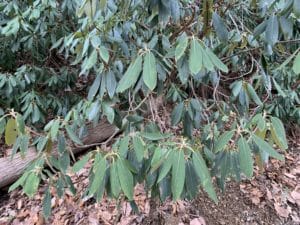Hello fellow readers, If I may share a story about a walk without Miss Ellie when she was ill, which leads to relishing the beauty and resilience of Native Rhododendrons.
A few weeks ago, I went for a morning walk without Ellie, which felt strange. Usually, after dropping the truck off for service, Ellie greets the desk folks with wiggles and squeals, then off we go for a walk along the Pauliskill River. On our way back, we walk through the parking lot of a church I once attended, crossing the footbridge leading to a ballfield. Imagining the kids at play always brings a smile. Four miles round trip was our regular morning road walk then. Now we go about two. Ellie is close to twelve, we think, not knowing for sure as she’s a rescue who came unexpectedly over ten years ago. How fast that time has gone. She couldn’t come that day as she was rallying back from a mysterious digestive issue.
It felt adventurous to walk a new way.
While walking in gratitude that Ellie is recovering, I couldn’t help imagining the day she’ll no longer be by my side. I didn’t know until recently there’s an official name for feeling a loss before it happens. It’s called anticipatory grief.
I ran some that day, as I used to with Ellie, but mostly walked the four miles (I’ve grown older too :^) taking a different route. It felt adventurous to walk a new way, enjoying the beauty of a landscape I had not yet seen.
Along Sandhill Road in Blairstown, NJ, there’s a steep hill carpeted with golden-brown leaves and a thick colony of native rhododendron standing twelve feet tall. The deciduous trees above, naked of leaves now, give them center stage.
About native rhododendrons
Native rhododendrons (Rhododendron maximum) are also called great laurel or rosebay rhododendron. They’re native from Canada south to Georgia and Alabama, creating dense colonies under trees, especially in the southern states of the Appalachian Mountains. West Virginia names Rhododendron maximum as their state flower.
They can grow twenty feet tall, sometimes thirty when exceedingly happy, and have dark green leathery leaves. Their showy pink, white, or light purple blooms are in their glory in June in our neck of the woods. Unlike other rhododendrons, the deer seem to stay clear, though I’ve used them on design projects an hour south of here where Bambi chomped.
 Native rhododendrons prefer moist, acidic, well-drained soil in full to part shade. Their leaves are waxy and last eight years before they shed, making room for replacements. Like most evergreens, the leaf drop isn’t noticeable as they age and shed gradually – not at the same time as deciduous trees do. It’s “one of the hardiest and largest evergreen rhododendrons,” writes the University of Texas Wildflower Center’s website.
Native rhododendrons prefer moist, acidic, well-drained soil in full to part shade. Their leaves are waxy and last eight years before they shed, making room for replacements. Like most evergreens, the leaf drop isn’t noticeable as they age and shed gradually – not at the same time as deciduous trees do. It’s “one of the hardiest and largest evergreen rhododendrons,” writes the University of Texas Wildflower Center’s website.
The magnificent beauty offers a habitat for wildlife such as bees, butterflies, and hummingbirds who adore their blooms. In the winter, they provide shelter for animals. I especially admire their ability to survive frigid temps. By curling their leaves, sometimes ever so tightly, they protect themselves from drying out, which can kill leaves or branches, sometimes a whole plant — resilience rocks.
Garden Dilemmas? AskMaryStone@gmail.com (and now on your favorite Podcast App.)
An update to this story is featured in Episode 92 of the Garden Dilemmas Podcast:
Click through to learn about Winter Burn.
Link to more about Native rhododendrons – Rhododendron maximum
Column Updated 1/22/23



